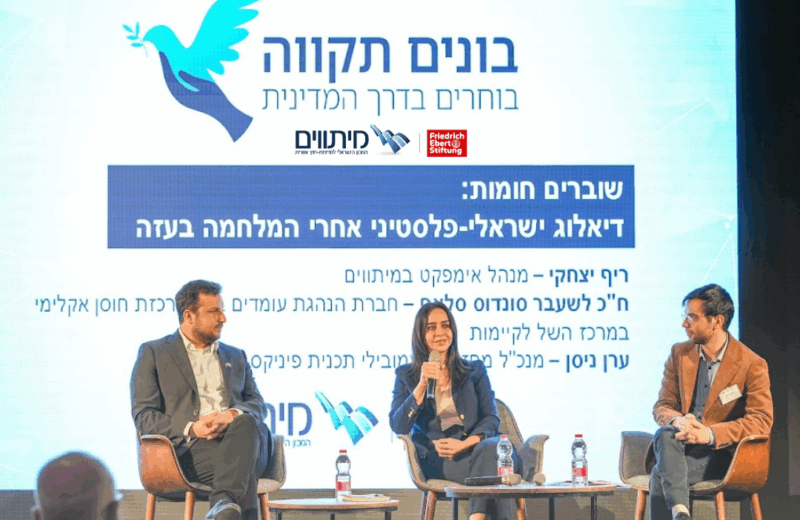 / All Events
/ All Events
The closing panel of Mitvim’s 8th Annual Regional Foreign Policy Conference – held in November 2025 at the Yitzhak Rabin Center in Tel Aviv, in partnership with Friedrich Ebert Stiftung Israel – focused on one central question: What role will civil society play in the day after, especially in the fragile transition from a ceasefire to a sustainable political process?
The panel was moderated by Reef Itzhaki and featured former MK Sundus Saleh, an entrepreneur, activist, and member of the leadership of Standing Together, as well as Eran Nissan, a leading figure in the Phoenix Framework – a joint Israeli–Palestinian initiative for designing a new political framework – and CEO of Mehazkim.
“A War for Peace”
Sundus Saleh opened with a quote that has accompanied her for years, from Yitzhak Rabin:
“Today we go to war- a war without dead and without wounded… a war for peace”.
In her words, this is precisely the role civil society has taken on over the past decade – and even more so since the judicial overhaul and the war: stepping into the vacuum left by an unstable political system and waging a “war for peace” through civic, community-based, and ideological means.
Saleh described a reality in which political instability grows the higher one ascends the political ladder – government turnover, coalition crises, deepening polarization – while vulnerable populations pay the price: repeated rounds of violence, poverty, crime and insecurity in Arab society, economic deterioration, and chronic underinvestment in welfare and infrastructure. Civil society organizations, she argued, step in “to bridge the gaps that policy creates.”
Standing Together, she said, strives to maintain a consistent voice of hope – a simple yet radical message that peace, equality, and social justice are not slogans but a political strategy: “the only path to reducing violence and ensuring security for both peoples.”
And precisely when state leadership deepens divisions and fuels societal fragmentation, “civil society must raise the voice that says a different future is possible.”
“Those Close to the Pain Should Be Close to Power”
Eran Nissan brought the perspective of a joint Israeli–Palestinian youth initiative – the Phoenix Framework – born out of the events of October 7.
He described how, on that same day, as a medic and ambulance driver at Soroka Hospital, he treated soldiers and police officers, Bedouin children from unrecognized villages, and survivors of the Nova massacre – side by side with Jewish and Arab medical staff.
“Even on that horrific day,” he noted, “the victims were Jews and Arabs – and the caregivers were Jews and Arabs.”
Alongside frantic messages from his Palestinian friends, these moments cracked what he called “the wall of consciousness” – the ability to see the “we” as something broader than “Israeli Jews only.”
He named Israelis and Palestinians who were murdered, kidnapped, or acted heroically to save lives, illustrating that the shared homeland between the river and the sea is not only a battleground but also a space of shared, if wounded, life.
A key insight he highlighted was demographic: the median age in Israel is 29, and in Palestine – 21.
Meaning: most people living here today were not even born when the Oslo Accords were signed.
“These are people who must live with the outcomes of agreements they never participated in,” he said, “and who face a reality shaped by trauma, climate crisis, social media, and the Abraham Accords – things no Oslo architect imagined in real time.”
The Phoenix Framework identifies six “opportunity zones”:
rebuilding Gaza; governance and reform (both in the PA and in Israel); transitional justice and accountability; the role of the international community; preparing societies for peace; and trauma and mental health.
Its guiding principle: “Those closest to the problem should be closest to power, and those closest to the pain know best what they need.”
“A Deep Crisis of Trust”
In her concluding remarks, Saleh described the long drive to the panel with her nine-year-old daughter, Carmel.
“I told her that I want her future to be better – and that I promise to do everything for that,” she said.
“Which minister, in the past decade, has said the same about Arab society?”
Arab society, she explained, has experienced a deep crisis of trust vis-à-vis the state for years.
On nearly every issue – crime and violence, women’s employment, planning and housing, climate adaptation, infrastructure – government responses are late, inconsistent, or absent.
Against this backdrop, partnerships with global philanthropy and international civil society organizations have become essential sources of support, investing in education, welfare, climate preparedness, and employment development.
“They Know It’s the Only Way to Peace”
Nissan expanded the discussion: liberal democracy rests on five pillars – an independent Supreme Court, a free press, academia, labor unions, and civil society.
“This government understands very well,” he argued, “that to advance a messianic vision of occupation and annexation, it must weaken and dismantle all five pillars.”
He pointed to systematic attacks on judicial review, media independence, academic freedom, and labor rights. Now, he said, the assault has reached civil society, through legislation designed to cripple NGOs.
“If there is one actor that increases the chances of a stable political settlement,” Nissan emphasized,
it is civil society’s ability to ‘have the back’ of political leadership – support it during negotiations and fight for implementation even when politics changes.
“Civil society is what ensures not only that a peace agreement is signed – but that it survives.”
Photo & video: Constantin Grossman


